- Home
- Edmund White
Inside a Pearl Page 5
Inside a Pearl Read online
Page 5
At the gym I met Barbara, a girl with a pretty, chubby face and an almost neurotic level of curiosity, and I cherished her for her clear enunciation, her avoidance of slang, and her linguistic patience. Like any good teacher, Barbara took my cloudy, twisted sentences and reworked them into model phrases out of a textbook. “Do you mean …” she’d say in French, and then rephrase my hazy remark in crystalline language.
Barbara had divorced parents—an architect father who worked in his spacious studio overlooking a garden and a batty, out-of-work mother who lived in a project for the poor, an HLM (Habitation loyer modéré, or medium-rent housing), though hers was located in a sleek skyscraper that Pompidou had thrown up in La Défense in the 1970s to modernize the capital, rival New York, and ultimately destroy the Parisian skyline. Fortunately for many Parisians, Pompidou would die before he could commit more mischief.
Barbara had sex on the brain and always wanted to know what different boys in the gym looked like naked in the locker room. She either was slightly dim or pretended to be. Over and over she’d ask me her slow, precise, primary questions about homosexuality.
“Now tell me, Edmond, have you ever tried sex with a woman? Are you afraid of the vagina? Do you think that there are teeth in there?”
But no matter how irritating her questions might be, she spoke clearly and slowly and always corrected my French in an inoffensive and automatic way. For instance, I had a habit of interchangeably using the adjectives immense, grand, and gros, yet Barbara had assigned a different nuance to each word. She was also a stickler for the progression of tenses—only a pluperfect could be nested inside a past clause. Despite her careful and kind ministrations, I never mastered these nuances. Barbara suggested I buy the Grévis, a thousand-page grammar text with which every French person is familiar. That this pedantry coexisted with an unhealthy or obsessive sexual curiosity should not have surprised me. What is certain is that if she were a mumbler, as many of us Americans are, I’d never have had anything to do with her. I envied her because she dated a slender young German with a mild, gentle manner and a large, uncircumcised penis, which he would towel-dry at length while chatting affably with me in the locker room. Then again, there was always a bit of seduction in the air.
At the gym I only met ordinary French office workers who like people everywhere led a treadmill existence called, colloquially, Boulot-Métro-Dodo—Parisian slang for “Job-Subway-Bed.”
A bit infuriatingly, at Marie-Claude’s dinners no one spoke in any predictable way. They were all intellectuals and writers who I learned had to show how ironic they could be, how droll, how quickly and easily they could anticipate every objection their interlocutors might make. The advancement of a simple idea or piece of information was not the object. The task was to show they were civilized beings who caught every allusion. They were capable of enclosing linguistic brackets inside conversational parentheses.
Moreover, they interrupted constantly, which, it amazed me to learn, was not considered rude in Paris. Madame de Staël, in her book about Germany, had written that German was not a proper language for intelligent conversation since you had to wait till the end of the sentence to hear the verb and couldn’t interrupt. I found interruptions especially irritating because I needed my full allotment of airtime in order to stagger toward my point.
But France, more than any other culture, is a tight, silver skein of names and references and half-stated allusions. Whereas America is so populous that even the writers don’t know all the names of the other writers, in France the members of the general educated public recognize the names of all French writers, whether they’ve read them or not. Of course it helps that writers are so often interviewed on television and by the press. What is true of writers is true of every other category of civilized experience; everyone knows the name and address of the best pastry maker, the best source of bed linens and napery, the best caterer, the best saddle and harness maker. They’re listed in every middle-class person’s mental collection of les bonnes adresses. Pourthault for sheets. Hédiard for food. Berthillon for sherbets and ice creams, so confident of its status that it closed for the entire month of August. Furthermore, failure to know any one of these names can even suggest inferior social origins.
This little world is a ball that is always in the air, bounced from hand to hand. Maybe it aids the native speakers that French (not Spanish, as everyone says) is spoken more rapidly than any other tongue, facilitating an unequaled density of reference and qualification. The composer Virgil Thomson, who lived a third of his long life in France, once pointed out that the French never grope for a word or stutter or go blank and say, “Uh …” He suggested that the French, unlike us, have what today we’d call a social GPS, an instant device for orienting themselves and navigating their way through their own culture, whereas we are not only often at a loss for words but also for opinions. The maddening confidence of the French (about the sequence three cheeses should be eaten in, from mildest to strongest, about exactly when to arrive at a party and when to leave, about how to sign off in a friendly but correct formal letter) fills in all social, and verbal, blanks.
I quickly learned that for a linguistic neophyte like me, the most difficult encounter to deal with was a party attended by a group of friends who’d all known each other forever. They’d be hard enough to cope with if they were speaking English, since even then they’d all be talking in shorthand. In French, they became incomprehensible.
The easiest social situation, I found, was talking to one person who was in love with you, someone who was studying your face for the slightest frown of confusion. The eyes, I figured out, always betray a failure to understand. If I didn’t want to flag my distress in a small dinner party or provoke a tedious explanation made merely for my benefit, I lowered my eyes like a Japanese bride. A diner à deux is the easiest exchange because we quickly become accustomed to a lover’s accent, turn of mind, range of reference and vocabulary—and he instantly gears his words to our level of comprehension.
I never failed to understand MC’s French. (We called Marie-Claude by her initials, pronouncing the letters in the English fashion and not as “Emm-Cay” à la française.) But the same person becomes more difficult to understand on the phone, where one has none of the same visual cues. After a party the most difficult event is a narrative French film, in which the actors usually speak more carelessly than random individuals on the street. Mumbling is proof of artistic verisimilitude. A television newscast is the next most difficult occasion, since it usually depends on a vocabulary and metaphors peculiar to itself. As a foreigner I realized what a closed world the news is for all but the initiated, an obscurity that is obviously worrying in a democracy.
Some American or French friends who were bilingual wondered why I was spending so much time with kids from the gym. I was too embarrassed to admit that I had chosen these particular kids for the slow, clear way they spoke French. When the great writer Emmanuel Carrère and his wife came to dinner, they teased me for my “adolescent evenings” (tes soirées ado).
I’d always been a bit arrogant about my lack of a need for intellectual stimulation. I had a scholarly, researcher’s side, which reveled in reading up on difficult subjects, but I also had a silly, social side that found it more relaxing to chatter about nothing, as if I wanted my “artist” side to prevail over the “intellectual” role. I suppose I thought an artist shouldn’t be too cerebral. Camus said that American novelists were the only fiction writers who didn’t think they also needed to be intellectuals. Whereas a French writer such as Gilles Barbedette, my translator and friend, wrote novels and essays and read only serious things such as Montaigne and Nietzsche, in America a friend such as Brad Gooch could listen to rap, read theology, dress in drag—Brad was closer to my sensibility. Even the range of Brad’s biographical subjects—Frank O’Hara, Flannery O’Connor, and the Persian mystic Rumi—showed his mix of piety and camp. That he was also an Armani model further broke the mold of the intell
ectual.
And yet it was arrogant of me to think that I was self-sufficient, that I didn’t need to be with smart people since I was smart enough all on my own. I always found my evenings with creative, analytical people especially enthralling, but something perverse made me not seek them out. Albert Dichy—who is funny, observant, and subtle and has a great memory and vast levels of information—always made me laugh hard and sent me off into a paroxysm of serious reading. Fortunately, we worked together researching my biography of Jean Genet; given how contrarian I am I might not have befriended him otherwise.
Albert was a dapper middle-aged Jew from Beirut who’d grown up speaking French because it was the only language his parents had in common. His mother, from Turkey, spoke Ladino, a form of medieval Spanish, and his father was an Egyptian whose first language was Arabic. Albert was sent to a French Jesuit lycée in Lebanon—which he hated because all the students were boys and he didn’t like males. In the streets Albert and his brother spoke Arabic, which eventually Albert’s brother taught in a French university; much to the dismay of his Jewish parents, the brother converted to Islam and married a second-generation Arab woman. Albert’s grandfather had been a rabbi.
When the Lebanese civil war started in 1975, the family took refuge in Britanny. Albert, his mother, and his brother were all French citizens since one of Albert’s maternal ancestors had taken French citizenship, and after that every succeeding generation had been careful to register at the French consulate. Only Albert’s father—who’d lost his Egyptian citizenship when Farouk was deposed and then lost the Iranian passport he’d bought when the shah was ousted—had had to wait to emigrate to France.
Albert’s first job in France had been going door-to-door and doing customer interviews for an electrical appliance company. Milan Kundera, who’d recently left Czechoslovakia and arrived in Rennes, was still so intimidated by “officials” asking questions that when Albert showed up at his door one day Kundera docilely submitted to Albert’s lengthy and detailed interview about his sweeper. Albert used to say he had in his possession one of the few unpublished interviews of the great Kundera.
As a youngster, Albert had met Genet in Beirut. Perhaps partly because of this encounter with the charismatic writer, Albert had become the world’s leading expert on Genet. Although he worked on many other writers (including Marguerite Duras; Georges Shéhadé, the Francophone poet from Lebanon; Pierre Guyotat; and Kateb Yacine, the Algerian nationalist writer), he published at Gallimard a collection of Genet’s political writings and prepared the Pléiade definitive edition of Genet’s plays. And I was supposed to be writing Genet’s biography. Genet had died in 1986, the year before I was commissioned to write the book. I kept trying to pry information out of Albert until I realized it would be simpler to hire him using some of my advance money. At the time, Albert was working part-time for IMEC (L’Institut Mémoires de l’Édition Contemporaine), a private library that housed the archives of publishing houses and contemporary writers. When he wasn’t at IMEC, Albert was making a living as an advertising copywriter. Once we started collaborating, he was able to quit his advertising work.
I took seven years to research and write my biography of Genet. Albert helped me at every step—writing summaries of interviews he conducted with people who’d known Genet, finding me relevant texts and photocopying them, establishing dates in a clear chronology, fact-checking everything I’d written. We went together to Alligny-en-Morvan, Genet’s village in Burgundy, where we visited a dozen people who’d known him, including his godmother—who was over a hundred years old and spoke to me in the dialect of the region, which her granddaughter had to translate into French. Even though the wife of my French editor, Ivan Nabokoff, was the sister of Pierre Joxe, the minister of the interior in Mitterrand’s government, I couldn’t convince Joxe to open Genet’s adoption dossier. But Albert found plenty of other details: that one of Genet’s childhood friends was named Querelle (the name of one of his later novelistic heroes); that one could still visit Mettray (Genet’s penal colony when he was an adolescent); that one could read the very literary letters Genet wrote to a woman he’d met in Czechoslovakia, a German Socialist refugee; that the widow of his doctor was still alive, a woman whose husband had prescribed Genet his massive doses of Nembutal (she’d helped Genet prepare the final draft of his longest play, The Screens, and she even showed me X-rays of Genet’s kidneys). Albert tracked down Genet’s record of arrests for petty crimes (for stealing a bolt of fabric from a department store and the autograph of a French king, and for doctoring a train ticket). We met a former convict from one of his prisons; an actress who had played the Madame in The Balcony and who shared her letters from Genet; the Swiss translator who accompanied Genet among the Black Panthers in America; the adopted son of one of his lovers and his principal heir; his obstructionist agent in London; the two high-born Palestinian women who’d played such a large role in his old age, and so on. Our interviews took me to Damascus and all over France and the United States.
Albert had a very precise manner—the product of a good French Catholic education. He loved to clarify his terms, nail down a fact, take notes in the hour after an encounter, annotate his reading. At the same time he was quick to see his own absurdities and those of others. And he was affectionate. I guess I define intelligence as the power to make new, surprising, wide-ranging associations and never to rely on automatic, untested generalities. With Albert I felt that I was in the presence of someone like Wittgenstein who was actually thinking out loud, thinking right in front of you, thinking a thought for the first time.
He was a great womanizer. Perhaps he was aided by the catholicity of his tastes. Although he had a beautiful, cultured wife who was a nonstop reader, an art dealer, and related to Georges Shéhadé, the Francophone poet from Lebanon, Albert had many adventures and affairs. The other day my French scholarly friend Alice Kaplan had dinner with Albert and a new girlfriend—who turned out once to have been his shrink. He was the male version of Catherine Millet, the author of The Sexual Life of Catherine M., which details her thousands of conquests. I’ve always been fascinated by libertinism and promiscuity, particularly the often philosophically self-assured French variety, and when I reviewed The Sexual Life I called it “the most explicit book about sex ever written by a woman.” I interviewed Millet at the literary festival at Brighton before a packed crowd, translating back and forth from English into French. I also spoke about her on the BBC. She was a very courteous, intelligent woman, an art critic who’s written a study of Salvador Dalí.
I’d met Michel Foucault in New York when I ran the New York Institute for the Humanities. Foucault was like me in one regard—he hated to talk about ideas during social evenings. (Richard Sennett, the sociologist and the founder of the Institute, once said to me, “You’ll tell everyone about your sex life; your only secrets are your ideas.”) Foucault’s partner, Daniel Defert, had given a fascinating seminar on how the Spanish colonists had classified the Aztecs according to medieval rankings based on clothes, the habitus (as in “The habit makes the man”). Foucault conducted a seminar on the last volume of his History of Sexuality, which was to be about the difference between the late pagan emphasis on which sex acts were permissible if committed between masters and slaves, or masters and masters, with little regard for the gender of the participants (e.g., a free man must never be the passive partner with a slave) and the early Christian obsession with sin, buggery, and fornication, not just in deed but in thought.
Foucault spoke English through an act of will—I don’t think he’d ever studied it and he wasn’t worried by his very strong accent. I thought that anyone as smart as he would of course speak English—or any other language he set his mind to. He was surrounded with beautiful ephebes such as Hervé Guibert, Mathieu Lindon, and Gilles Barbedette, but sexually his type was burly and macho.
But he never thought the sexual identity of someone was all that revealing, and as his disciple I mustn’t pretend I’m
saying something profound about him by talking about his kinkiness. He was both fiery and sweet, a rare combination of traits. He showed me that you can be passionately aggressive about advancing your views, arguing your position, but in the bosom of your friends mild and even humble, certainly sweet. Maybe that explains his aversion to discussing ideas except in the classroom; he was deeply engaged in intellectual discourse, was quick to the point of paranoia in defending his theories, but he didn’t want combativeness to poison his social evening. Ce qu’aimer veut dire by Mathieu Lindon (the son of Beckett’s publisher) is an extended, intimate view of Foucault by a real friend.
Toward the end of his life Foucault thought the basis of morality after the death of God might be the ancient Greek aspiration to leave your life as a beautiful, burnished artifact. Certainly in his case his gift for friendship, his quick sympathy, his gift for paradox, his ability to admire left his image as a man, as an exemplary life, highly burnished. The people who said his promiscuity or his death from AIDS diminished him were just fools.
Marie-Claude would not countenance my complaints about the French language.
“But your French is perfect!” she said in English.
She and I spoke English all the time except at her dinner parties, where she’d invite the latest literary star to bask in our short-lived adoration. I’d been put through similar paces when A Boy’s Own Story had come out in France (Un jeune Americain). I’d assumed that one charming older gay man, the editor of Science et Vie, was actually interested in me personally and would want to see me often in the future. In fact, I’d made a modest little splash, and the editor as a true Parisian needed to know everyone and everything dans le vent, à la page, au courant—all ways of referring to what’s new, the latest manifestation of l’air du temps.
Of course journalists back in New York had to keep up with the latest trends, but they wouldn’t have invited the trend to dinner. New Yorkers were always exhausted after their twelve hours at the office and two hours at the gym and hour at the shrink’s; when they got home, they would crawl into a hot bath, and from there to a huge immaculate bed where they ate their plate of take-home lobster ravioli and watched a talk show until they sank into restless, clamorous sleep. They couldn’t be bothered seeing their oldest friends, much less a total stranger. A friend in New York was defined as someone you never needed to see, who would never get angry at you for ignoring him.

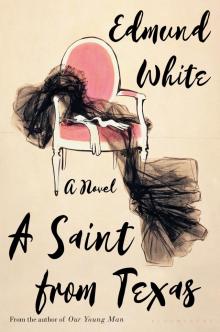 A Saint from Texas
A Saint from Texas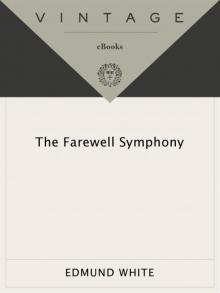 The Farewell Symphony
The Farewell Symphony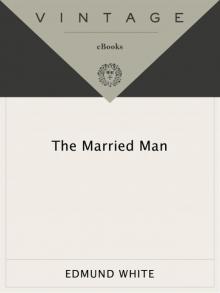 The Married Man
The Married Man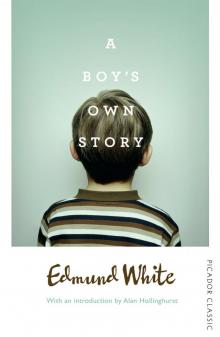 A Boy's Own Story
A Boy's Own Story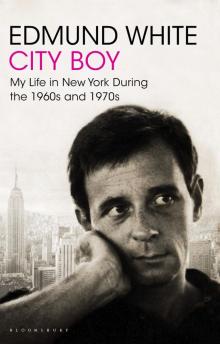 City Boy
City Boy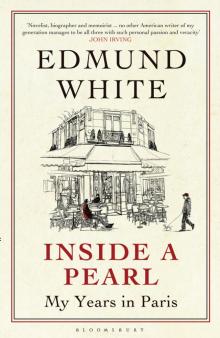 Inside a Pearl
Inside a Pearl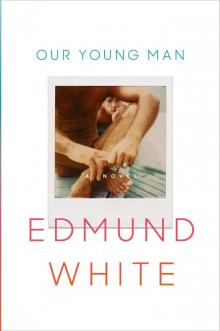 Our Young Man
Our Young Man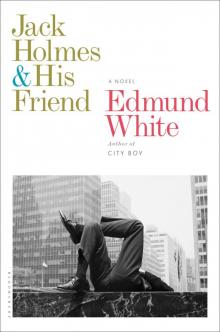 Jack Holmes and His Friend
Jack Holmes and His Friend